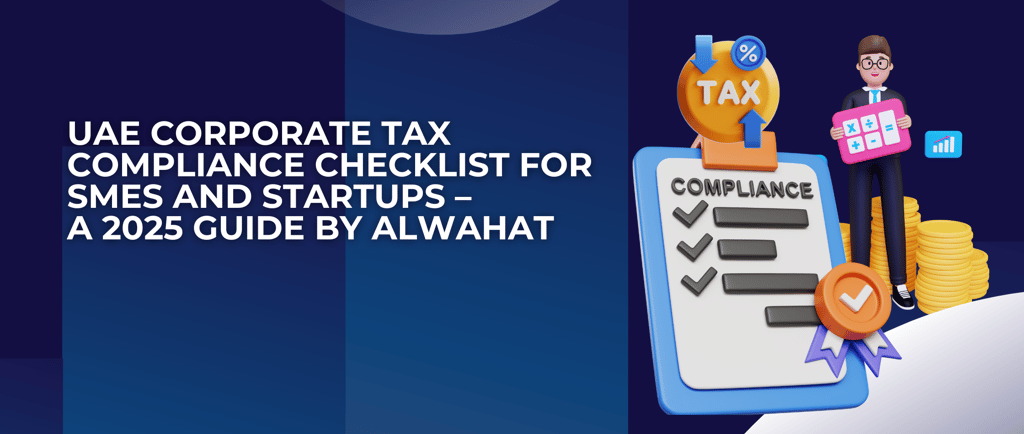UAE Corporate Tax Compliance Checklist for SMEs and Startups – A 2025 Guide by ALWAHAT
A step-by-step compliance guide to help SMEs and startups in the UAE navigate Corporate Tax regulations in 2025 with clarity and confidence.
7/4/20253 min read


UAE Corporate Tax Compliance Checklist for SMEs and Startups – A 2025 Guide by ALWAHAT
A step-by-step compliance guide to help SMEs and startups in the UAE navigate Corporate Tax regulations in 2025 with clarity and confidence.
The implementation of Corporate Tax in the UAE marks a significant shift for businesses, especially small and medium enterprises (SMEs) and startups, many of whom are dealing with tax obligations for the first time. Ensuring compliance under the Federal Tax Authority (FTA) guidelines is no longer optional—non-compliance can lead to financial penalties, audit risks, and even business disruption.
At ALWAHAT ACCOUNTS AND INTERNAL AUDIT SERVICES, we’ve compiled a detailed Corporate Tax Compliance Checklist to help SMEs across Dubai, Sharjah, Abu Dhabi, and other Emirates navigate the new tax regime with clarity and confidence.
📍 Why SMEs and Startups Must Pay Attention
The UAE Corporate Tax system, effective from 1 June 2023, requires businesses to:
Register with the FTA
Maintain compliant accounting records
Calculate and report taxable profits
File annual tax returns
Even businesses with modest turnover or operating in Free Zones are not automatically exempt. Knowing what applies to you and when is crucial.
✅ Step-by-Step Corporate Tax Compliance Checklist for UAE SMEs
📌 1. Check If You’re Subject to Corporate Tax
Start with determining your taxability:
Is your annual net profit more than AED 375,000?
✅ If yes, you're liable to pay 9% Corporate Tax.
✅ If no, you still must register and file returns (even with 0% liability).
Are you a Free Zone Entity?
Qualifying Free Zone Persons (QFZPs) may still enjoy a 0% rate, but only on qualifying income, and must meet strict compliance rules.
Do you fall under exemptions?
Government entities, certain investment funds, and public benefit organizations may be exempt, but still need to notify the FTA.
📎 Need Help? ALWAHAT offers entity classification assessments to confirm your tax obligations.
📌 2. Corporate Tax Registration via FTA
All legal persons in the UAE—including Free Zone companies, holding companies, and branches—must register for Corporate Tax with the FTA, regardless of their profit status.
Required documents:
Trade license(s)
Emirates ID and passport of shareholders/partners
Memorandum of Association (MoA) or Articles
Company structure details
💻 FTA Portal: https://eservices.tax.gov.ae
🚨 Deadline alert: Failing to register within the prescribed period attracts AED 10,000 penalty.
📌 3. Prepare and Maintain Compliant Financial Records
To calculate taxable profits, you must:
Maintain accurate books of account
Prepare accounts using IFRS or IFRS for SMEs
Keep invoices, contracts, bank statements, and supporting vouchers
Use software or ERP systems aligned with FTA compliance standards
🗂️ Records must be kept for at least 7 years from the end of the relevant tax period.
📌 4. Determine Your Taxable Income
Your taxable income is derived by adjusting your accounting profit for:
Non-deductible expenses (e.g., fines, personal expenses, entertainment)
Exempt income (e.g., qualifying dividends, certain foreign income)
Adjustments for related party transactions under Transfer Pricing rules
Unrealized gains/losses, capital allowances, and carried forward losses
📊 If you’re unsure how to handle tax adjustments, our experts at ALWAHAT can prepare a reconciled Tax Computation Sheet (TCS) for you.
📌 5. File Your Corporate Tax Return on Time
Once the financials are ready:
Submit a Corporate Tax Return via the FTA portal
Due within 9 months after the end of your financial year
For example, if your year ends on 31 Dec 2024 → Due by 30 Sep 2025
🧾 Filing includes:
Net profit/loss
Adjusted taxable income
Applicable exemptions/deductions
Disclosures (e.g., related party transactions, foreign tax credits)
📌 Penalty for late return submission: AED 500 per month, increasing over time
📌 6. Stay Audit-Ready & Retain Records
The FTA may request audits or ask for clarification at any time. You must:
Maintain organized digital and physical records
Keep filed returns, supporting schedules, and correspondence
Respond to FTA queries or audit notices promptly
💼 ALWAHAT offers FTA audit preparedness reviews to ensure you’re never caught off guard.
🧠 Bonus Tips for Startups & Small Businesses
Use cloud-based accounting tools for error-free bookkeeping.
Assign an in-house or outsourced Corporate Tax Coordinator.
Track deadlines with automated reminders.
Avoid combining multiple license incomes in one return unless they are under one legal entity.
Don’t delay tax registration even if your business isn’t yet profitable.
🚀 ALWAHAT: Helping You Stay Compliant & Confident
Whether you're a tech startup, a trading company, or a small professional services firm, ALWAHAT ACCOUNTS AND INTERNAL AUDIT SERVICES is your trusted partner in ensuring Corporate Tax compliance.
We provide:
End-to-end tax registration and filing support
Sector-specific tax planning strategies
Free Zone compliance reviews
Affordable tax packages for SMEs
📍 Serving all Emirates: Dubai | Sharjah | Abu Dhabi | Ajman | RAK | UAQ | Fujairah
📞 Get Expert Help Today
Don't risk non-compliance. Let the experts handle it.
⚠️ Disclaimer:
This blog is for general information purposes only and does not constitute professional tax or legal advice. For specific assistance tailored to your business, contact ALWAHAT. Please refer FTA for further guidance.
Address
Faisal 2 Bldg, Office No 203, King Faisal St, Al Nad- Al Qasimia, Sharjah, UAE
Level 17, World Trade Center, Khalifa Bin Zayed, the first street- Abudhabi
Unit 32 -
4th Floor, AWR Properties - Al Fahidi Heights Office Tower, beside Central Mall ,near Sharaf DG metro station exit 4,Dubai ,U.A.E
Contacts
info@alwahataudit.com
+971589373943
We empower you to make well-informed decisions and successfully attain your financial objectives.


All copyrights reserved @Al-Wahat Accounts & Internal Audits | Designed - Abhijith.digital
Subscribe to our newsletter


